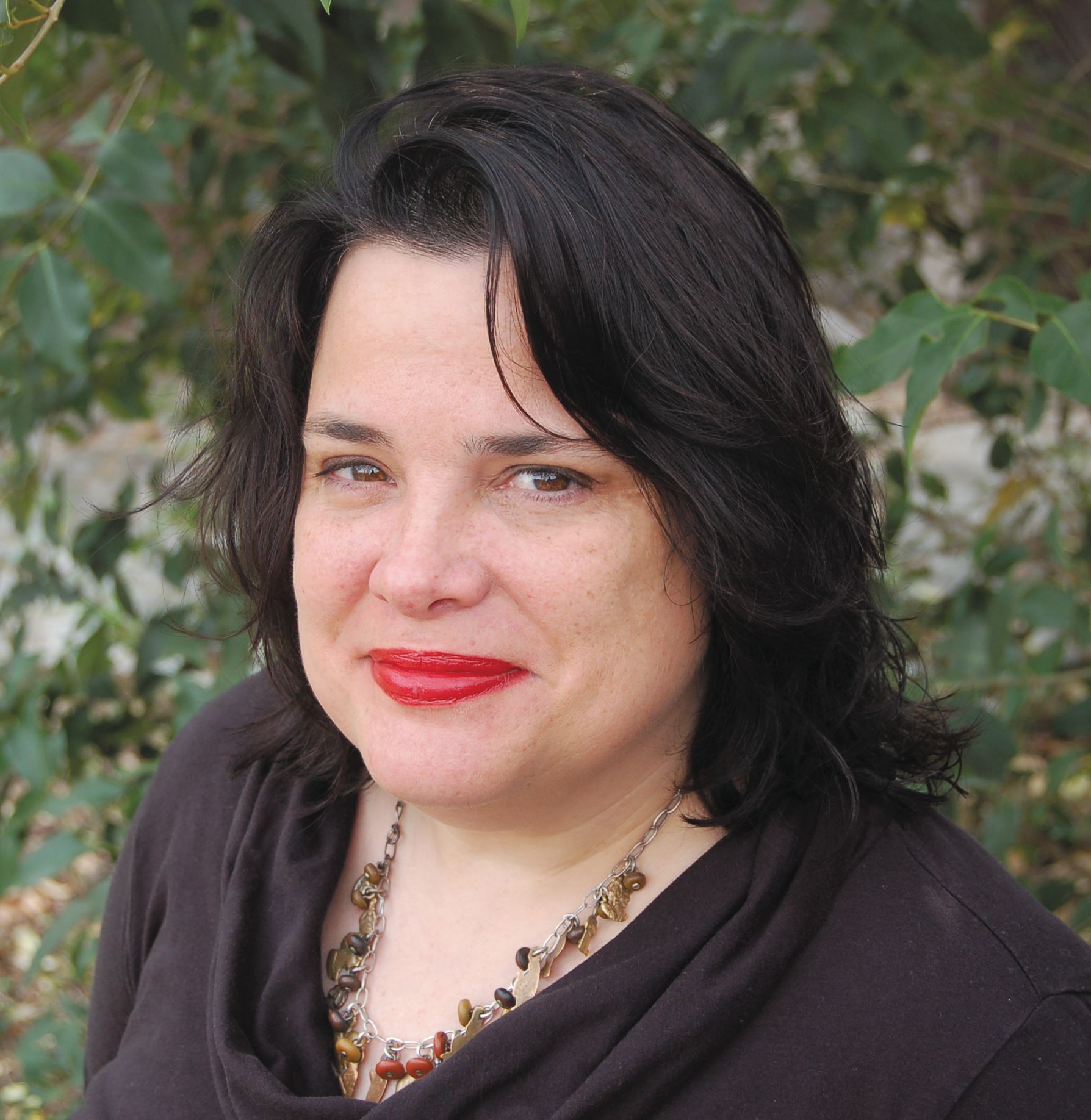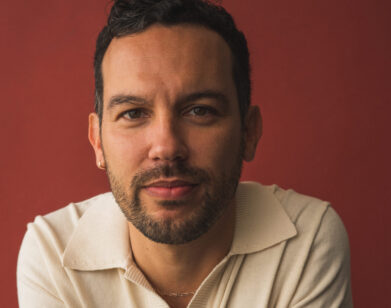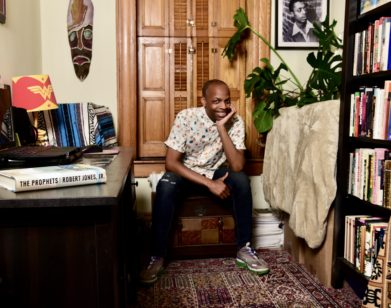books!
The Author Elizabeth McCracken on Puppets and the Sea

Photo by Edward Carey.
Elizabeth McCracken really loves puppets. In her new short story collection, The Souvenir Museum: Stories, they—along with an array of ventriloquists and clowns— make a number of appearances, as her characters navigate family dynamics, romances, and their relationships with themselves. “I’ve always really loved ventriloquism,” says McCracken, “I like imitation things.” The author’s preoccupation with dialogue—whether internal to her characters or among them—is evident throughout the collection. In a story titled “It’s Not You,” a heartbroken protagonist travels to a hotel to recover from her grief. “My plan was to drink bourbon and take baths,” she says. The Souvenir Museum revels in, among other things, moments of intimacy and self-comfort. Recently, the collection was longlisted for the National Book Award, making it McCracken’s third acknowledgement by the institution. In honor of this achievement, McCracken spoke to Interview about the mystique of literary awards, writing under the influence, and, well, puppets.
———
JULIANA UKIOMOGBE: I just finished your book, and I’m so excited to talk about it.
ELIZABETH MCCRACKEN: Thank you very much!
UKIOMOGBE: You were just longlisted for the National Book Award for the third time. Does it feel different this time around?
MCCRACKEN: It’s still exciting. I mean, it’s a funny time to talk, because this week I found out that I didn’t make it onto the shortlist. But I’m still delighted to have been longlisted. So, my response isn’t going to be like, “Yes! Who knows what will happen next?” Because it already happened. But it’s a wonderful feeling anytime your name makes it into the same sentence as “National Book Award.”
UKIOMOGBE: How do you feel about awards in general?
MCCRACKEN: Oh, heck. Awards are wonderful, because they bring attention to books that might not otherwise get that attention. But it’s complicated, because there is a level of randomness. I say that as somebody who has judged a lot of awards. You never know what’s happening on the judging panel. Writing literary fiction is generally an extremely quiet and invisible activity. I teach as well, and I always want to remind my students, and myself, that it can feel like there’s just one way to judge writing and art, and there’s not. It’s not like a foot race where you can say, “Yes, Usain Bolt is the best runner. We have evidence year after year. He’s the best.” There’s no such thing when it comes to art.
UKIOMOGBE: When you’re teaching, or even when you’re judging other books, what do you look for?
MCCRACKEN: I really love great sentences. When I’m judging or teaching, I can admire and work with writing that is not deeply invested in great sentences, but it’s hard for me to ever actually love or feel transformed by it. When I’m judging something, I want to feel changed by the work in some way. I really like it when it’s clear that the author is deeply interested in what they’re writing about, and is surprised by some aspect of it.
UKIOMOGBE: How do you know when you’ve written a good sentence?
MCCRACKEN: When I’ve described something in a way that is surprising, but also efficient. Something that allows you to understand something complex in few words. That’s my favorite thing.
UKIOMOGBE: Your book is called The Souvenir Museum. Do you have a favorite museum that you’ve been to?
MCCRACKEN: I will go to any museum of any kind. The souvenir museum that the book is named for is not one of my favorite museums, but is an actual museum. I like the Louvre, and the strange little house museums of New England painters you’ve never heard of. I really love the Isabella Stewart Gardner Museum in Boston. I grew up around Boston, and I don’t think I ever went there with my parents. I never had an instructive trip there, the way I did with the Museum of Fine Arts when I went on school trips. So it felt very much like a museum I discovered for the first time by myself. It might be my favorite.
UKIOMOGBE: I noticed that the book has a lot of ventriloquists, clowns, and puppets.
MCCRACKEN: I love strange entertainment and show business, but I also know that not everybody does. The last story in the entire book is about puppets. There’s a lot that I don’t do on purpose as a writer, but I did say, “I know people hate puppets and I’m going to end with puppets.”
UKIOMOGBE: When did that interest in those things begin? Was it a childhood love or did you grow into it?
MCCRACKEN: I have always loved puppets. There were always puppets around the house when I was growing up. I don’t know whether that’s just a feature of having grown up in the 1970s. But I have a bunch of my childhood puppets—these really strange educational puppets are on display in my house. I like imitation things. I’ve always really loved ventriloquism, but not the ventriloquism that uses puppets.
UKIOMOGBE: Oh, interesting!
MCCRACKEN: I like them to be separate. I don’t like hand puppets in ventriloquism. I like the strangeness of the hard doll that is trying to look human and never will. There’s something I find very moving and strange about that.
UKIOMOGBE: Do you think your love of writing is synonymous with that?
MCCRACKEN: They do seem quite connected to me. You’re trying to make something look lifelike, and it’s always going to be smaller than the actual thing. It’s always going to be a little bit weirder, but there will be moments where you believe the thing to be alive.
UKIOMOGBE: If you could turn any of these short stories into a film, which would you choose?
MCCRACKEN: “The Irish Wedding.”
UKIOMOGBE: That’s a good one. It’s so chaotic.
MCCRACKEN: Yeah, very chaotic. It has a lot of good roles for character actors. A lot of dialogue. And that’s another thing. Some of the stories feel so based on the interior life, that it seems like it’d be harder to do a movie. Like, “Two Sad Clowns” is not enough for a movie.
UKIOMOGBE: I really love the story titled “It’s Not You.” Can you tell me a bit about how that came together?
MCCRACKEN: It’s a very bizarre story. I had it half-written. The characters were there and I had the image of the hotel, but I hadn’t finished it. Then my friend Michael Ray, who’s the editor at Zoetrope All-Story, said, “Do you have a story?” And it was three years ago on my birthday. I had champagne for breakfast. And I thought, “Okay I’m just going to pull together the story and send it to Michael.” And he liked it. It was pulled together quickly under the influence of alcohol. And now, it’s been anthologized in two places and it’s a lot of people’s favorite story in the collection. I don’t know what to make of that.
UKIOMOGBE: It’s so good!
MCCRACKEN: Thank you very much! It’s one of those stories that I don’t think I’ll be able to replicate. I did it in such an off-hand way. It’s a bit of a mystery to me, still.
UKIOMOGBE: Is that the one story that people seem to gravitate the most towards?
MCCRACKEN: Yeah, and it’s also a bit different than a lot of the other stories. It’s the only first-person story.
UKIOMOGBE: Do you prefer writing in the first or third person?
MCCRACKEN: I used to write almost everything in the first person. My first collection of short stories, which is now almost 30 years old, is all first person stories with one third person story, and this collection is all third person with one first. I got into a groove of writing third-person stories, but it’s a real pleasure to write first. And I do it now for that reason. Maybe that’s another reason why that story is different. I had to concentrate in a different way when I was writing it. I once wrote a story where I told myself that I wasn’t allowed to use any semicolons because I wanted to look at my sentences a little more carefully. It was a very interesting assignment. I love semi-colons.
UKIOMOGBE: Aren’t they great? I love a good em-dash.
MCCRACKEN: Me too!
UKIOMOGBE: I noticed that a lot of the stories take place either near or on the water. I looked at your Twitter and you tweet about swimming a lot. What’s your connection to water and how does it make its way into your work?
MCCRACKEN: It’s probably as simple as, I am from New England and I live in the middle of Texas. [Laughs] I really miss the water. But the swimming that I do is in the center of Austin, at this amazing swimming pool. I think it’s three acres and it’s intensely beautiful. You know, Texas is a little hard to love these days, shall we say.
UKIOMOGBE: Yes, it is very hard.
MCCRACKEN: For a New Englander, particularly. But when I stay at home, I work on novels mostly, and I’m more likely to think of short story ideas when I travel. My husband also grew up near the ocean, so when we travel together, we tend to go to the ocean. When I’m thinking about short stories, I’m likely looking at a body of water already.
UKIOMOGBE: Do you write every day?
MCCRACKEN: I do not write every day. I never have. I’ve always done better working quite intensely over shorter periods of time. When I teach, I’m not great at getting a ton of work done. There are some people who find it very pleasurable to write 2000 words a day every single day or to get up and write at a particular time. Sometimes during the semester, I’ll get up very early and come into my campus office at 5:30 in the morning. The trick is to leave my house before anybody else wakes up.
UKIOMOGBE: Have your students read your book?
MCCRACKEN: I have some students who read my work when they’re in my class, and I have other students who will say, “I decided not to read any of my teacher’s work until they’re not my teacher anymore.” Listen, I’m going to go on the record and say that I think that’s weird. It’s not that I expect my students to read my work, but it seems strange to me to avoid it completely.
UKIOMOGBE: What’s next for you? Are you working on another collection of short stories?
MCCRACKEN: I’m working on a novel. I wrote much of this novel in 2019 and then my editor said, “Do you remember that you have a deadline for a short story collection in November?” And I went, “Holy heck!” So I put this book aside and then finished the short stories. Then the pandemic began.
UKIOMOGBE: I certainly can’t wait to read it.



